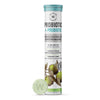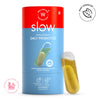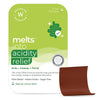Ever had that uncomfortable burning sensation in your stomach, the kind that feels like a tiny fire brewing inside? It can sneak up after a heavy meal, too much caffeine, or even stress. That sensation isn’t just annoying—it’s your body’s way of telling you something’s off.
Acidity and indigestion are common culprits, and while they might not seem like a big deal at first, ignoring them can lead to bigger digestive troubles.
The good news? You don’t always need to rely on over-the-counter meds. Some of the best remedies come straight from your kitchen. Let’s dive into simple yet powerful ways to put out the fire and bring your stomach back to balance.
What Causes a Burning Sensation in the Stomach?
That uncomfortable burning in your stomach isn’t random—it’s usually triggered by an imbalance in stomach acid or digestive function. Here are some of the most common reasons behind this:
- Acid Reflux & GERD: When stomach acid flows back into the esophagus, it can create a burning sensation that extends to the chest (hello, heartburn!).
-
Spicy or Oily Foods: While delicious, these can irritate the stomach lining and trigger acid production.
-
Caffeine & Alcohol: Both can relax the lower esophageal sphincter, allowing acid to escape and cause discomfort.
-
Stress & Anxiety: Your gut and brain are closely linked, and stress can lead to excess acid production, resulting in a burning feeling.
-
Skipping Meals or Eating Too Fast: An empty stomach or rushed eating can disrupt digestion and increase acid levels.
-
H. pylori Infection: This bacterial infection can damage the stomach lining, leading to inflammation and discomfort.
-
Certain Medications: Overuse of painkillers, NSAIDs, or antibiotics can irritate the stomach lining and cause acidity.
Understanding the root cause of your discomfort is key to finding the right remedy.
Effective Remedies To Try
1. Sip on Warm Water First Thing in the Morning
Your gut loves a little warmth. A glass of warm water on an empty stomach kickstarts digestion and helps flush out toxins, making it a simple but effective way to prevent acidity.
2. Aloe Vera: A Cooling Elixir
Aloe vera isn’t just great for your skin—it works wonders inside, too. A spoonful of fresh aloe vera juice soothes the stomach lining and reduces irritation, making it a great go-to for acid reflux relief.
3. Bananas: Nature’s Antacid
If your stomach’s feeling fiery, grab a banana. It’s packed with natural antacids that neutralize stomach acid and protect the digestive lining. Plus, it’s a great snack for keeping hunger (and acidity) at bay.
4. Ginger: Small but Mighty
A little ginger goes a long way. This natural anti-inflammatory helps reduce stomach irritation and improves digestion. Try sipping on ginger tea or chewing a small piece of raw ginger for quick relief.
5. Coconut Water: Instant Soothing
Feeling the burn? A glass of fresh coconut water can restore pH balance and cool your digestive system. Bonus: It’s hydrating and packed with essential electrolytes.
6. Fennel Seeds: Your Post-Meal Savior
Fennel seeds have been used for centuries to aid digestion. Chewing on a teaspoon of fennel seeds after meals can ease bloating, reduce gas, and calm acidity almost instantly.
7. Apple Cider Vinegar: The Unlikely Hero
It might seem counterintuitive, but diluted apple cider vinegar can actually help balance stomach acid levels. Just mix a tablespoon in warm water and sip before meals to prevent reflux.
8. Buttermilk: Your Dairy Detox
Rich in probiotics and lactic acid, buttermilk helps regulate digestion and cool down the stomach. Adding a pinch of cumin or black salt enhances its gut-friendly benefits.
9. Basil Leaves: Small but Powerful
Chewing on fresh basil leaves or sipping basil tea can reduce acidity and gas. This fragrant herb works as a natural antacid, giving your stomach a much-needed break.
10. Cold Milk: A Quick Fix
Milk contains calcium, which helps neutralize stomach acid. A small glass of cold milk (without sugar) can bring instant relief—but if you’re lactose intolerant, skip this one.
11. Cumin Water: A Detoxifying Digestive Aid
Cumin seeds help stimulate digestion and prevent acid buildup. Boil a teaspoon in water, let it cool, and sip throughout the day to keep acidity in check.
12. High-Quality Digestive Supplements: The Ultimate Support
Sometimes, your body needs a little extra help. A well-formulated digestive supplement with plant-based enzymes,probiotics, and alkalizing minerals can offer sustained relief from acidity. Look for one that is free from artificial additives and acidity relief supplements loaded with natural ingredients like papaya enzymes, fennel extracts, and soothing herbs to restore balance naturally.
Small Lifestyle Changes
Beyond home remedies, a few daily habits can make a world of difference:
-
Eat smaller, more frequent meals to avoid overwhelming your digestive system.
-
Limit caffeine, alcohol, and spicy foods, which can trigger acidity.
-
Stay active—even a short walk after meals helps digestion.
-
Manage stress, since anxiety can worsen acid reflux.
-
Sleep with your head elevated to prevent nighttime heartburn.
Final Thoughts: Listen to Your Gut
Your stomach is incredibly resilient, but when it sends signals of discomfort, it’s best to listen. Whether it’s stress, food choices, or just a sluggish digestive system, these simple remedies can help restore balance.
And if acidity and digestive discomfort are frequent visitors in your life, it might be time to look beyond quick fixes and focus on long-term gut health. Choosing the right natural supplements, alongside a mindful diet and lifestyle, can keep your digestive system happy—and that fiery feeling far, far away.































Leave a comment